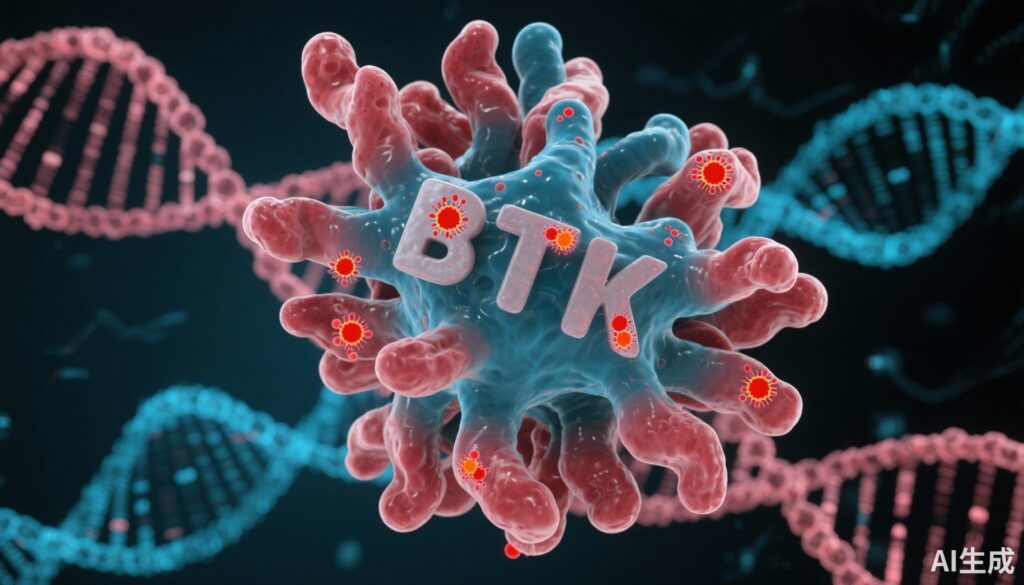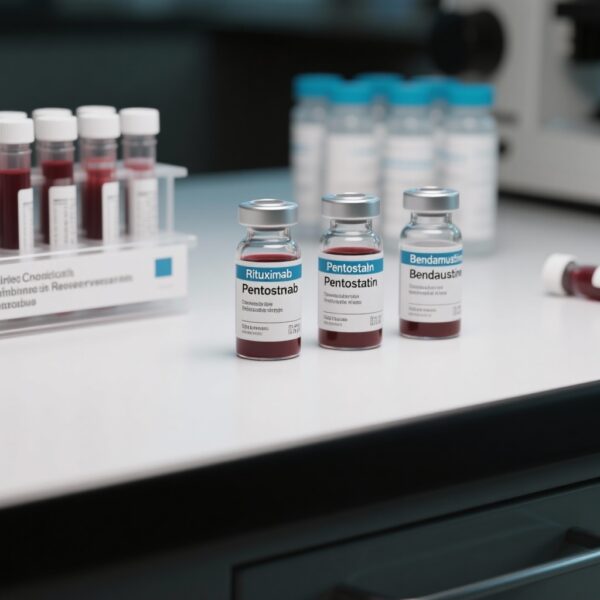Highlight
Pirtobrutinib, a reversible non-covalent BTK inhibitor, shows promise for CLL patients resistant to covalent BTKi therapy. Genomic analyses from the BRUIN trial reveal a complex landscape of BTK and non-BTK mutations at baseline and at progression, underscoring the dynamic clonal evolution underpinning resistance. Sensitive DNA sequencing uncovers pre-existing low-frequency mutations that may drive acquired resistance, emphasizing the need for comprehensive genomic monitoring during therapy.
Study Background
Chronic lymphocytic leukemia (CLL) represents the most common adult leukemia, often characterized by a chronic, indolent course yet marked by periodic relapses requiring sequential lines of therapy. Targeting Bruton tyrosine kinase (BTK), a critical mediator in B-cell receptor signaling, revolutionized CLL treatment, with covalent BTK inhibitors (cBTKi) like ibrutinib delivering durable responses. Nonetheless, resistance inevitably emerges, largely driven by mutations at BTK’s C481 residue that disrupt covalent binding.
Pirtobrutinib is a novel, highly selective, non-covalent reversible BTK inhibitor designed to overcome resistance encountered with cBTKi by binding outside the C481 site. Early-phase clinical data, including from the BRUIN trial, demonstrated notable efficacy of pirtobrutinib in relapsed/refractory (R/R) CLL patients previously exposed to cBTKi. However, the genomic determinants of response and resistance to pirtobrutinib remained less explored.
Study Design
The study investigated genomic correlates of response and resistance to pirtobrutinib in R/R CLL patients enrolled in the phase 1/2 BRUIN trial (NCT03740529). All patients had prior exposure to cBTKi. Peripheral blood mononuclear cells (PBMCs) were collected longitudinally at baseline (pre-treatment), during therapy, and at the time of progressive disease (PD). Comprehensive targeted DNA sequencing was performed to characterize mutational profiles, with particular focus on BTK mutations and other recurrent CLL genomic alterations.
Key Findings
Baseline Genomic Landscape: Analysis identified frequent baseline mutations including BTK (43% of patients), TP53 (38%), SF3B1 (25%), NOTCH1 (23%), ATM (19%), XPO1 (11%), PLCG2 (9%), BCL2 (8%), and 17p deletions (28%). BTK mutations predominantly affected the C481 site, with C481S comprising 85% of these mutations, followed by C481R (10%), C481F (6%), and C481Y (4%).
Genomic Changes at Progression: At progression, 68% of patients (60/88) acquired at least one new mutation. Notably, 44% had new BTK mutations, while 24% acquired mutations in other genes. A total of 55 new BTK mutations were identified in 39 patients, spanning gatekeeper mutations such as T474I/F/S/L/Y/P (26%), kinase-impaired mutation L528W (16%), additional C481 variants (5%), and novel ATP-binding pocket proximal mutations including V416L, A428D, D539G/H/A, and Y545N.
Intriguingly, in 84% of patients with progressive disease, a decrease or complete clearance of the baseline BTK C481x mutations was observed, suggesting dynamic clonal shifts during therapy. Utilizing a highly sensitive assay, 37% of acquired BTK mutations found at progression had evidence of pre-existence at low allele frequencies before treatment initiation, implicating these rare clones in driving eventual resistance. When reevaluated at progression with sensitive detection, a similar frequency of BTK mutations (39%) was noted, with all patients harboring detectable acquired mutations by this method.
Clonal Dynamics and Resistance Complexity: The study reveals substantial clonal complexity in BTK mutation profiles, with multiple distinct resistance mutations emerging in individual patients. The presence of kinase-impaired and gatekeeper mutations highlights diverse mechanisms by which CLL cells evade pirtobrutinib inhibition. Moreover, resistance without clear genomic drivers in a subset of patients indicates alternative resistance pathways, potentially via epigenetic or microenvironmental factors, warranting further investigation.
Expert Commentary
This investigation into the genomic determinants of pirtobrutinib resistance provides critical insights into the adaptive landscape of CLL under selective pressure from targeted therapy. The identification of low-frequency pre-existing BTK mutations prior to treatment initiation challenges the notion that resistance mutations solely emerge de novo and supports the paradigm of clonal evolution and selection. Clinically, this underscores the importance of highly sensitive molecular monitoring to predict and potentially preempt resistance.
Further, the diversity of resistance-conferring mutations—beyond the canonical C481 site—illustrates the evolutionary plasticity of malignant B cells. This also raises considerations for future drug design, where next-generation inhibitors might need to address a broader spectrum of molecular targets. The absence of obvious genomic drivers in some cases suggests multi-faceted resistance mechanisms, highlighting the need for integrated genomic, proteomic, and microenvironmental analyses.
Limitations of the study include the reliance on circulating tumor cells which may not fully capture spatial heterogeneity. Additionally, mechanistic validation of novel mutations’ impact on BTK function and pirtobrutinib binding remains to be elucidated. Nevertheless, this work sets a genomic framework for resistance and response that can guide personalized therapeutic strategies in heavily pretreated CLL.
Conclusion
Pirtobrutinib represents an important advancement in treating R/R CLL patients with cBTKi resistance. This study elucidates the intricate and dynamic genomic underpinnings that influence therapeutic response and acquired drug resistance, emphasizing the critical role of comprehensive and sensitive mutation detection. Understanding these molecular determinants can facilitate tailored treatment decisions and inspire the development of next-generation BTK inhibitors or combination regimens targeting diverse resistance mechanisms to improve patient outcomes in CLL.
Funding and Clinical Trials Information
This study was conducted as part of the phase 1/2 BRUIN trial (NCT03740529) and funded by relevant research grants and institutional support, as detailed in the original publication.
Reference
Brown JR, Nguyen B, Desikan SP, et al. Genomic Determinants of Response and Resistance to Pirtobrutinib in Relapsed/Refractory Chronic Lymphocytic Leukemia. Blood. 2025 Oct 7:blood.2024027009. doi:10.1182/blood.2024027009. Epub ahead of print. PMID: 41055698.



